Submission Date:
Question:
First question: With the expiration of the Executive Orders on June 24th, 2021, including the Order modifying the requirements of the Open Meetings Law, are libraries back to the "old way" of conducting trustee meetings?
Follow-up question: If the answer to the first question is "yes," does this mean that trustees who still want/need to attend remotely from home must disclose their address in the meeting notice?
Answer:
First question: Yes...with the expiration of the Executive Orders on June 24th, including the Order modifying the Open Meetings law,[1] things are "back to normal."
Or, as the Committee on Open Government, the authority on the State's Open Meetings Law (OML), put it:

So, does this mean "trustees who still want/need to attend remotely from home must disclose their address in the meeting notice?"
Various case law and commentary about the OML has confirmed that when a public body needs to meet via teleconference, the public must be able to attend from any remote location "calling in" to the meeting, and that location should be part of the meeting notice.[2]
Or, as the COOG put it in Advisory Opinion 5535 in 2018:
"So long as the public is permitted to attend at any location at which a member participates and can observe the members wherever they may be, I believe that the members may participate and be counted for purposes of attaining a quorum and for voting, and that a meeting may validly be held." [emphasis added]
For large public bodies such as the Regents, the New York Power Authority, and other entities that must hold publicly accessible meetings, and whose board members may reside in far-flung areas of the state, the use of publicly accessible call-in sites comes with an IT team and a budget.
For a public library, whose members generally reside within that library's area of service, this "back to normal" pretty much means that you're back to meetings in person.
Of course, under the Not-for-Profit Corporation law (which, along with the Education Law, governs the conduct of library meetings), a library board of trustees is allowed to conduct meetings telephonically.[3] When coupled with the requirements of the OML, however, that latitude is severely reigned in--since whatever space is used for the remote call-in must be accessible to the public, and included in the notice.
For this reason, unless a library trustee is very comfortable inviting the public into their home, I advise against using the "dial in from home" option.[4]
NOTE: This answer does not consider if a trustee needs to attend remotely due to it being an accommodation under the ADA. That is a separate and critical question; for now, I'll simply say that adherence to the OML should not rule out consideration of ADA issues.
The transparency created by Education Law 260-a's requirement that public libraries abide by the Open Meetings Law is laudable--but is also based on older notions of technology. Now that the State of New York has lived under different rules for over a year, we might see some changes in legislation.
But for now, we're "back to normal."
I hope this is helpful.
[1] Allowing them to be held via teleconference so long as the meeting is accessible to the public, recorded, and transcribed. For more comments on this, see "Ask the Lawyer" Executive Order 202 and NY Open Meetings Law and Open Meetings Law and COVID.
[2] See https://docs.dos.ny.gov/coog/otext/o5535.html and https://docs.dos.ny.gov/coog/otext/o5575.html.
[3] See NFPCL Section 708(c) "Unless otherwise restricted by the certificate of incorporation or the by-laws, any one or more members of the board or of any committee thereof who is not physically present at a meeting of the board or a committee may participate by means of a conference telephone or similar communications equipment or by electronic video screen communication. Participation by such means shall constitute presence in person at a meeting as long as all persons participating in the meeting can hear each other at the same time and each director can participate in all matters before the board, including, without limitation, the ability to propose, object to, and vote upon a specific action to be taken by the board or committee."
[4] I recently saw a very good presentation on parliamentary procedure for library boards. The presenter commented that disclosure of home addresses should not be made, due to safety concerns. I absolutely agree with that caution, but must emphasize that if a trustee calls in from a remote location, with the emergency modification of the law over, the OML requires that all "locations" of the meeting (including a remote call-in site) must be disclosed.
Tag:
Board of Trustees, COVID-19, Emergency Response, Executive Order, Open Meetings Law
